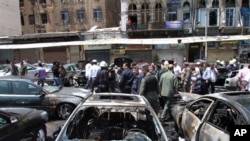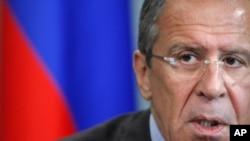The United States says escalating violence in and around Damascus is a result of President Bashar al-Assad assaulting the Syrian people and a sign that he is losing control of the capital.
A bomb exploded near Syria's main judiciary complex, known as the Palace of Justice, in central Damascus on Thursday, wounding three people. A day earlier, militants attacked a pro-government private TV station on the capital's outskirts, killing three journalists and four security guards. Syria's government blamed the attacks on armed terrorists whom it says are behind the country's 15-month uprising against Assad's 11-year rule.
U.S. State Department spokesman Victoria Nuland said Thursday Washington also "condemns violence against innocents from any direction that they come from." But, she said President Assad has created the conditions for a loss of government control in Damascus and elsewhere by "perpetrating violence against his own people." Nuland said the "preponderance of force is his and the responsibility is his."
Turkey also increased pressure on Assad, deploying troops and anti-aircraft batteries to its border with Syria in response to the downing of a Turkish military jet by Syrian fire last week. Turkish Prime Minister Recep Tayyip Erdogan has ordered his troops to treat any Syrian security forces approaching the border as a target. The Turkish government also has been hosting Syrian rebels and tens of thousands of Syrian refugees.
Iranian television broadcast a rare interview with Assad on Thursday, saying he rejected foreign pressure to end his suppression of the uprising. A Farsi translation dubbed over the interview quoted the Syrian president as saying foreign pressure "did not have an effect in the past and it will not have any influence in the future."
The Farsi translator also quoted Assad as accusing Turkish officials of pursuing policies that lead to the killing of Syrians. But, the translation said the Syrian president makes a distinction between the Turkish government and what he called the positive view of Turkish people towards Syria. Iranian television said the interview was conducted last week.
The developments come as the International Committee of the Red Cross said fighting between government and rebel forces has continued in the rebellious central city of Homs, preventing aid workers from evacuating sick and wounded civilians. The ICRC said a joint Red Cross and Syrian Arab Red Crescent team tried to enter Homs on Wednesday after both sides pledged to pause the fighting, but turned back because "agreed-upon conditions were not met."
The ICRC did not say who violated the agreements. But, Syrian state news agency SANA said the government accused "terrorists" of foiling the aid mission to Homs. There was no immediate response from rebels in the city.
World powers were preparing to gather in Geneva for a Saturday meeting called by international peace envoy Kofi Annan, who wants them to agree on new ideas for resolving the Syrian conflict. U.N. diplomatic sources said Annan is proposing the formation of a Syrian unity government that does not explicitly exclude Assad but would bar those whose participation could undermine the country's stability. Details were vague.
Syrian opposition groups said they would not accept any political transition plan that lacks an explicit call for Assad to step down.
Russian Foreign Minister Sergei Lavrov said any solution to the crisis must be decided by Syrians themselves. He said Russia, a longtime ally of the Assad government, will not support external "meddling."
"The meeting in Geneva was intended to support Kofi Annan's plan and it must set the conditions for the end of violence and the start of an all-Syrian national dialogue, and not pre-determine the contents of this dialogue," Lavrov said.
Lavrov said it was a "mistake" not to invite Syrian ally Iran to the Geneva talks, calling the country an "influential player" in the situation. The United States had objected to Iran being included in the meeting, which will be attended by the five permanent members of the U.N. Security Council plus representatives of Turkey and the Arab League. Saudi Arabia, a prominent supporter of the Syrian opposition, also was not invited.
U.S. Secretary of State Hillary Clinton told reporters in Latvia that Washington believes any solution must comply "with international standards on human rights, accountable governance, the rule of law and equal opportunity for all people of Syria." Clinton said the Annan framework "lays out how to arrive at that."
Lavrov and Clinton are due to meet in St. Petersburg on Friday to discuss the Syria crisis.
Joshua Landis, a Syria expert at the University of Oklahoma, said the Obama administration has steadily gained confidence that its policy of regime change "is the correct one and is going to happen sooner or later." He said Russia still appears convinced that it can find a way to keep Assad loyalists in power even without the Assad family itself.
But Landis said the balance of power in Syria is changing.
"The Arab majority, the Sunni Arab majority, is going to win this in the long run. That's what's been happening throughout the Middle East in the last several decades," Landis said.
Landis predicted the transition from minority Alawite domination to Sunni Muslim rule in Syria would be protracted and messy. But he noted that Western and Arab sanctions on the Syrian government and assistance to the rebels are already bearing fruit.
"Western Europe, the Gulf countries, America are starving the Syrian government with very strict sanctions. And they are feeding the opposition, pumping in money, arms [and] intelligence. This is rapidly changing the balance of power," Landis said.
Landis said Assad's government still has many assets, but the rebel Free Syrian Army "is becoming much more lethal, getting much better at terrorist-type attacks and is taking the fight to the regime."
A bomb exploded near Syria's main judiciary complex, known as the Palace of Justice, in central Damascus on Thursday, wounding three people. A day earlier, militants attacked a pro-government private TV station on the capital's outskirts, killing three journalists and four security guards. Syria's government blamed the attacks on armed terrorists whom it says are behind the country's 15-month uprising against Assad's 11-year rule.
U.S. State Department spokesman Victoria Nuland said Thursday Washington also "condemns violence against innocents from any direction that they come from." But, she said President Assad has created the conditions for a loss of government control in Damascus and elsewhere by "perpetrating violence against his own people." Nuland said the "preponderance of force is his and the responsibility is his."
Turkey also increased pressure on Assad, deploying troops and anti-aircraft batteries to its border with Syria in response to the downing of a Turkish military jet by Syrian fire last week. Turkish Prime Minister Recep Tayyip Erdogan has ordered his troops to treat any Syrian security forces approaching the border as a target. The Turkish government also has been hosting Syrian rebels and tens of thousands of Syrian refugees.
Iranian television broadcast a rare interview with Assad on Thursday, saying he rejected foreign pressure to end his suppression of the uprising. A Farsi translation dubbed over the interview quoted the Syrian president as saying foreign pressure "did not have an effect in the past and it will not have any influence in the future."
The Farsi translator also quoted Assad as accusing Turkish officials of pursuing policies that lead to the killing of Syrians. But, the translation said the Syrian president makes a distinction between the Turkish government and what he called the positive view of Turkish people towards Syria. Iranian television said the interview was conducted last week.
The developments come as the International Committee of the Red Cross said fighting between government and rebel forces has continued in the rebellious central city of Homs, preventing aid workers from evacuating sick and wounded civilians. The ICRC said a joint Red Cross and Syrian Arab Red Crescent team tried to enter Homs on Wednesday after both sides pledged to pause the fighting, but turned back because "agreed-upon conditions were not met."
The ICRC did not say who violated the agreements. But, Syrian state news agency SANA said the government accused "terrorists" of foiling the aid mission to Homs. There was no immediate response from rebels in the city.
World powers were preparing to gather in Geneva for a Saturday meeting called by international peace envoy Kofi Annan, who wants them to agree on new ideas for resolving the Syrian conflict. U.N. diplomatic sources said Annan is proposing the formation of a Syrian unity government that does not explicitly exclude Assad but would bar those whose participation could undermine the country's stability. Details were vague.
Syrian opposition groups said they would not accept any political transition plan that lacks an explicit call for Assad to step down.
Russian Foreign Minister Sergei Lavrov said any solution to the crisis must be decided by Syrians themselves. He said Russia, a longtime ally of the Assad government, will not support external "meddling."
"The meeting in Geneva was intended to support Kofi Annan's plan and it must set the conditions for the end of violence and the start of an all-Syrian national dialogue, and not pre-determine the contents of this dialogue," Lavrov said.
Lavrov said it was a "mistake" not to invite Syrian ally Iran to the Geneva talks, calling the country an "influential player" in the situation. The United States had objected to Iran being included in the meeting, which will be attended by the five permanent members of the U.N. Security Council plus representatives of Turkey and the Arab League. Saudi Arabia, a prominent supporter of the Syrian opposition, also was not invited.
U.S. Secretary of State Hillary Clinton told reporters in Latvia that Washington believes any solution must comply "with international standards on human rights, accountable governance, the rule of law and equal opportunity for all people of Syria." Clinton said the Annan framework "lays out how to arrive at that."
Lavrov and Clinton are due to meet in St. Petersburg on Friday to discuss the Syria crisis.
Joshua Landis, a Syria expert at the University of Oklahoma, said the Obama administration has steadily gained confidence that its policy of regime change "is the correct one and is going to happen sooner or later." He said Russia still appears convinced that it can find a way to keep Assad loyalists in power even without the Assad family itself.
But Landis said the balance of power in Syria is changing.
"The Arab majority, the Sunni Arab majority, is going to win this in the long run. That's what's been happening throughout the Middle East in the last several decades," Landis said.
Landis predicted the transition from minority Alawite domination to Sunni Muslim rule in Syria would be protracted and messy. But he noted that Western and Arab sanctions on the Syrian government and assistance to the rebels are already bearing fruit.
"Western Europe, the Gulf countries, America are starving the Syrian government with very strict sanctions. And they are feeding the opposition, pumping in money, arms [and] intelligence. This is rapidly changing the balance of power," Landis said.
Landis said Assad's government still has many assets, but the rebel Free Syrian Army "is becoming much more lethal, getting much better at terrorist-type attacks and is taking the fight to the regime."






